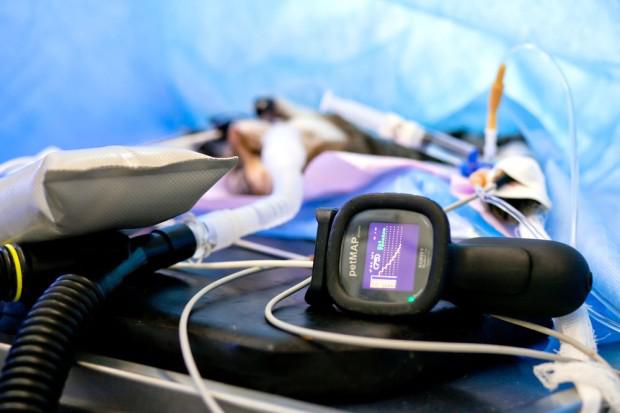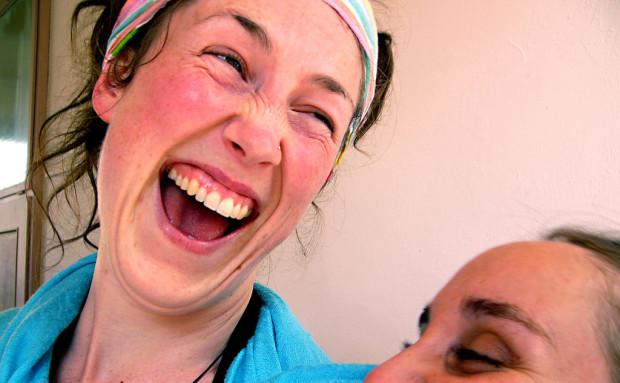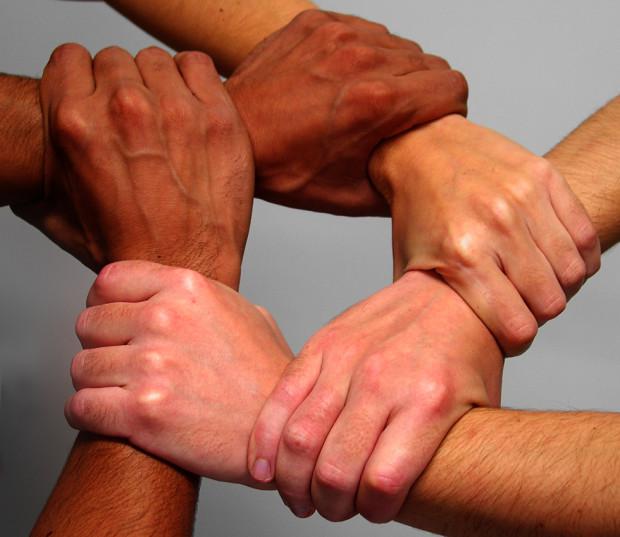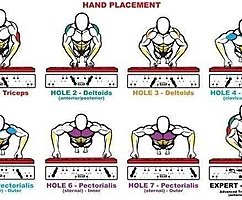What we know about ourselves ...
 Bashny.Net
Bashny.Net
Simple questions
After a couple of hundred thousand years jumping on this big blue ball in our old decrepit shells of meat we pretty much figured out what exactly is "to be a man." We know which side you need to eat, and how it then goes, and this, by and large, all that matters. No? Need more? You thought that we nowadays know everything about the human body, thanks to our amazing science? Of course, we know a lot, but there are some incredibly simple questions to which so far is not enough convincing answers. There are guesses, theories, hypotheses, but when it comes down to it, they do not explain anything.

What is pain?
Pain - an unpleasant, but a universal human experience. This is one of the first things that we encounter in our lives when we are born, and this experience is likely to be one of the last in our lives.
But what exactly is the pain? How does it work? Do you feel the same as your neighbor? If you both feel it is equally, if not dishonest it because it deserves much worse? If you can not answer these questions, do not worry - the science, too, can not. All these eggheads scientists who are developing medicines for pain and prescribe them to you, they can not even agree on what is a pain.
Perhaps the best way to demonstrate this - look at fibromyalgia, a disease that is best described as "It hurts everything." There are no physical tests that can confirm the presence of the disease in you - no brain scan or blood test or a seance can not confirm your status. How do doctors diagnose it? Well, you fill out the form. Do you have pains in different parts of the body that doctors can not explain? Yes I Do? Boom: you have fibromyalgia. Or perhaps demonic possession. Or aliens.
Office of FDA Food and Drug Administration (FDA) approved drugs for the treatment of fibromyalgia, because they seem to help, but no one knows why, and whether it is at all. But the era of science fiction is on the way: there are certainly some high-tech brain scans, in which doctors can determine when you have something hurts.
In fact, doctors say that patients with fibromealgiey there are differences in brain scans, but they vary in different patients - no doctor can not look you in the skull and finally say, do you have the disease or not. In fact, no doctor can tell how much you have something hurts, because they have only recently begun to take the first steps in how to detect pain in the human brain.
According to the Torah wager, associate professor of psychology and neuroscience at the University of Colorado-Boulder, and the possible character of "Star Wars": "Now there is no clinically acceptable way to measure pain and other emotions, but to ask the person how he feels».
So how are you feeling today? In addition to some irritation relatively inevitable uncertainties associated with medicine, your body and the whole universe, we are referring to.

Why work anesthesia?
Anesthesiology - truly a miracle of modern science, but it's more than just scary when you think about it: with a few random chemicals anesthesiologists shut down parts of your brain. Too much - and you will never wake up. It is not enough - and if you survive the past life as a soldier of the First World War to the operations conducted with a hacksaw. But what do these chemicals? As they interact with your body in this manner to achieve the desired delicate balance? Well, that's the worst part: the science does not know.
Basically, anesthesia was developed over the last hundred years medical workers, who said: "Here, inflate the guy that's it and see what happens. Still shouting? Well, try something from it. " Trial and error gave us a clear picture of what we can use to achieve the desired effect - anything from complex steroids to full light xenon. But the question of why these substances send your mind into sleep mode without completely disabling and inscriptions "died" with your name, there is no clear answer.
The main reason why it is difficult to understand how anesthesia affects the mind, is that science does not really know what "consciousness" and how it works. There is no definitive test that would show that people are currently aware of something - the best they can do anesthesiologists is to look for the presence of certain brain waves, physical reactions, and ... wait a minute ... sensitivity to pain. But, as we have already discussed, science has no way to determine whether you feel the pain, so it is entirely up to you - show them that you are not anesthetized.
And if you get it wrong, do not worry: you will have a few hours to think about what else you could answer while you're locked inside your body, mind will cry when strangers in masks will be dealt with you on part. No pressure, however.

Why do we laugh?
Some believe that laughter - this is a signal that the perceived threat is not actually a real danger, while others believe that it is a reaction to the result, as expected. Still others think that it's because Jim Carrey talks with his fifth point, and that, as a rule, no one does.
All of them, at least to some extent right, because no one knows for sure why we laugh. We know, however, that laugh more than any other emotional reaction affects all areas of our brain, including the motor. More surprising, however, is the fact that most of our laughter has no relation to the comic situations. Studies have shown that less than 20% of laughter is the result of something funny. Much more often we laugh to emphasize innocuous statements to fill a pause in the conversation, or because our sophisticated cunning plan has finally begun to bear fruit.
There is one thing that we (probably) know - how laughter arose: it arose in a situation where primates suffocated during heavy tickling sessions. This of course leads to the inevitable question: "But why do we tickled?", Which leads to the inevitable answer "God knows».

Why do we relate well to each other?
If in the days of our hunter-gatherers, when the main thing was - to survive, you have found the middle of the forest multilevel Layer Cake, the last thing you would think, is to share with others, because it would be contrary to your own survival instinct. This is your cake and you punched in the face to all those who would try to reach him his thieving fingers.
Original selfless acts of kindness were absolutely unprofitable: to pass on their genes, people were looking for capable partners to survive, while altruism is stamped evolutionary dead end, such as gills, tails and other appendages
So how altruism survive? You guessed it: Unknown.
Scientists are trying to uncover the secret of altruism most of the last century. In the 1960s, George Price has even developed a complex mathematical equation in an attempt to figure out how altruism could survive when he seems to be so disadvantageous for survival. Price was so absorbed in his studies that need to invite strangers to live in his apartment until he hung up on his theorem, sitting in his office. In the end, when he realized that he had nothing more to give to others, he killed himself with scissors.

Why do some of us - left-handed?
About 90% of the population of our planet right-handed, the remaining 10%, respectively - left-handed. This bias is unique and is observed only in humans, while the other creatures in the animal world is largely divided equally, if not show any preference.
Why are we so different? In the end, with the brain in left-handers all right - their speech controlled by the left hemisphere, as well as right-handers. Also, right- often dominates the left leg and vice versa, indicating that the preference does not apply to the other parts of the body. Scientists have tried to find the answer since when left-hander, seemingly separated from decent society, but still it remains a mystery.
We know that left-handedness - a genetic trait, it means that the genes responsible for it, must have a certain advantage to spread further. However, it is unclear what kind of advantage it might be. Since the overall percentage of left-handers is quite low, we can safely assume that we see the last of the possessing this trait, which gradually removed from the gene pool, but this is not the case: the study of prehistoric human settlements showed that the percentage of left-handers remained virtually the same as it was at the Throughout the history of mankind.
Going beyond the left-handedness, the fact that we all have a dominant hand, and in many ways remains a mystery. While we focus on it, the guys in the white coats are scratching their heads over the total asymmetry of the human anatomy: our heart on the one hand, our lungs differently situated with respect to one another, the left hangs lower than the right. While this phenomenon is observed in great apes, the human brain is the most remarkable in this respect: our brains wildly asymmetrical, and some scientists believe that this asymmetry can be a defining feature that makes us human.
This, as well as our ability to speak with our fifth points.
©
After a couple of hundred thousand years jumping on this big blue ball in our old decrepit shells of meat we pretty much figured out what exactly is "to be a man." We know which side you need to eat, and how it then goes, and this, by and large, all that matters. No? Need more? You thought that we nowadays know everything about the human body, thanks to our amazing science? Of course, we know a lot, but there are some incredibly simple questions to which so far is not enough convincing answers. There are guesses, theories, hypotheses, but when it comes down to it, they do not explain anything.

What is pain?
Pain - an unpleasant, but a universal human experience. This is one of the first things that we encounter in our lives when we are born, and this experience is likely to be one of the last in our lives.
But what exactly is the pain? How does it work? Do you feel the same as your neighbor? If you both feel it is equally, if not dishonest it because it deserves much worse? If you can not answer these questions, do not worry - the science, too, can not. All these eggheads scientists who are developing medicines for pain and prescribe them to you, they can not even agree on what is a pain.
Perhaps the best way to demonstrate this - look at fibromyalgia, a disease that is best described as "It hurts everything." There are no physical tests that can confirm the presence of the disease in you - no brain scan or blood test or a seance can not confirm your status. How do doctors diagnose it? Well, you fill out the form. Do you have pains in different parts of the body that doctors can not explain? Yes I Do? Boom: you have fibromyalgia. Or perhaps demonic possession. Or aliens.
Office of FDA Food and Drug Administration (FDA) approved drugs for the treatment of fibromyalgia, because they seem to help, but no one knows why, and whether it is at all. But the era of science fiction is on the way: there are certainly some high-tech brain scans, in which doctors can determine when you have something hurts.
In fact, doctors say that patients with fibromealgiey there are differences in brain scans, but they vary in different patients - no doctor can not look you in the skull and finally say, do you have the disease or not. In fact, no doctor can tell how much you have something hurts, because they have only recently begun to take the first steps in how to detect pain in the human brain.
According to the Torah wager, associate professor of psychology and neuroscience at the University of Colorado-Boulder, and the possible character of "Star Wars": "Now there is no clinically acceptable way to measure pain and other emotions, but to ask the person how he feels».
So how are you feeling today? In addition to some irritation relatively inevitable uncertainties associated with medicine, your body and the whole universe, we are referring to.

Why work anesthesia?
Anesthesiology - truly a miracle of modern science, but it's more than just scary when you think about it: with a few random chemicals anesthesiologists shut down parts of your brain. Too much - and you will never wake up. It is not enough - and if you survive the past life as a soldier of the First World War to the operations conducted with a hacksaw. But what do these chemicals? As they interact with your body in this manner to achieve the desired delicate balance? Well, that's the worst part: the science does not know.
Basically, anesthesia was developed over the last hundred years medical workers, who said: "Here, inflate the guy that's it and see what happens. Still shouting? Well, try something from it. " Trial and error gave us a clear picture of what we can use to achieve the desired effect - anything from complex steroids to full light xenon. But the question of why these substances send your mind into sleep mode without completely disabling and inscriptions "died" with your name, there is no clear answer.
The main reason why it is difficult to understand how anesthesia affects the mind, is that science does not really know what "consciousness" and how it works. There is no definitive test that would show that people are currently aware of something - the best they can do anesthesiologists is to look for the presence of certain brain waves, physical reactions, and ... wait a minute ... sensitivity to pain. But, as we have already discussed, science has no way to determine whether you feel the pain, so it is entirely up to you - show them that you are not anesthetized.
And if you get it wrong, do not worry: you will have a few hours to think about what else you could answer while you're locked inside your body, mind will cry when strangers in masks will be dealt with you on part. No pressure, however.

Why do we laugh?
Some believe that laughter - this is a signal that the perceived threat is not actually a real danger, while others believe that it is a reaction to the result, as expected. Still others think that it's because Jim Carrey talks with his fifth point, and that, as a rule, no one does.
All of them, at least to some extent right, because no one knows for sure why we laugh. We know, however, that laugh more than any other emotional reaction affects all areas of our brain, including the motor. More surprising, however, is the fact that most of our laughter has no relation to the comic situations. Studies have shown that less than 20% of laughter is the result of something funny. Much more often we laugh to emphasize innocuous statements to fill a pause in the conversation, or because our sophisticated cunning plan has finally begun to bear fruit.
There is one thing that we (probably) know - how laughter arose: it arose in a situation where primates suffocated during heavy tickling sessions. This of course leads to the inevitable question: "But why do we tickled?", Which leads to the inevitable answer "God knows».

Why do we relate well to each other?
If in the days of our hunter-gatherers, when the main thing was - to survive, you have found the middle of the forest multilevel Layer Cake, the last thing you would think, is to share with others, because it would be contrary to your own survival instinct. This is your cake and you punched in the face to all those who would try to reach him his thieving fingers.
Original selfless acts of kindness were absolutely unprofitable: to pass on their genes, people were looking for capable partners to survive, while altruism is stamped evolutionary dead end, such as gills, tails and other appendages
So how altruism survive? You guessed it: Unknown.
Scientists are trying to uncover the secret of altruism most of the last century. In the 1960s, George Price has even developed a complex mathematical equation in an attempt to figure out how altruism could survive when he seems to be so disadvantageous for survival. Price was so absorbed in his studies that need to invite strangers to live in his apartment until he hung up on his theorem, sitting in his office. In the end, when he realized that he had nothing more to give to others, he killed himself with scissors.

Why do some of us - left-handed?
About 90% of the population of our planet right-handed, the remaining 10%, respectively - left-handed. This bias is unique and is observed only in humans, while the other creatures in the animal world is largely divided equally, if not show any preference.
Why are we so different? In the end, with the brain in left-handers all right - their speech controlled by the left hemisphere, as well as right-handers. Also, right- often dominates the left leg and vice versa, indicating that the preference does not apply to the other parts of the body. Scientists have tried to find the answer since when left-hander, seemingly separated from decent society, but still it remains a mystery.
We know that left-handedness - a genetic trait, it means that the genes responsible for it, must have a certain advantage to spread further. However, it is unclear what kind of advantage it might be. Since the overall percentage of left-handers is quite low, we can safely assume that we see the last of the possessing this trait, which gradually removed from the gene pool, but this is not the case: the study of prehistoric human settlements showed that the percentage of left-handers remained virtually the same as it was at the Throughout the history of mankind.
Going beyond the left-handedness, the fact that we all have a dominant hand, and in many ways remains a mystery. While we focus on it, the guys in the white coats are scratching their heads over the total asymmetry of the human anatomy: our heart on the one hand, our lungs differently situated with respect to one another, the left hangs lower than the right. While this phenomenon is observed in great apes, the human brain is the most remarkable in this respect: our brains wildly asymmetrical, and some scientists believe that this asymmetry can be a defining feature that makes us human.
This, as well as our ability to speak with our fifth points.
©
Tags
See also
All I know about women
That's what every woman expects from a real man ... I never thought that everything is so simple!
How to find: a man really confident and good at playing the role?
These 4 simple questions tell all about your character!
Trick yourself stronger: the Most dangerous thing we can do
Jamie Oliver: What is food and why teach children to cook
Tibetan personality test: answer 3 simple questions to learn something important about yourself
















